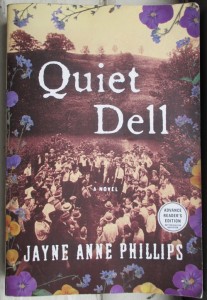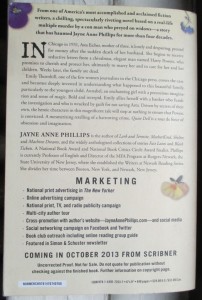 #FridayReads, Aug 9–Jayne Anne Phillips’ “Quiet Dell,” a mesmerizing novel drawn from the annals of infamous true crime. It’s set in 1931, when a West Virginia killer lured a Chicago-area widow and her three children in to his fatal embrace. Those murders, and others he’d committed, were discovered and he was arrested by authorities in the hamlet of Quiet Dell, WV, near the city of Clarksburg. In this true-life set-up, Jayne Anne Phillips has found it necessary to mint only a handful of fictional characters alongside the figures from history, all of whose actions she renders with imaginative power; her Acknowledgments page names “four” wholly new characters, including female journalist, Emily Thornhill, who becomes the readers’ eyes and ears on the case which she’s covering for her newspaper. The fictional Emily has had thrust upon her the adoption of the dead family’s orphaned dog–a real-life bull terrier with the Victorian-tinged name of Duty–earlier the target of a vicious kick by the malefactor, now playing a valuable canine role in the investigation with his damning identification of the killer.
#FridayReads, Aug 9–Jayne Anne Phillips’ “Quiet Dell,” a mesmerizing novel drawn from the annals of infamous true crime. It’s set in 1931, when a West Virginia killer lured a Chicago-area widow and her three children in to his fatal embrace. Those murders, and others he’d committed, were discovered and he was arrested by authorities in the hamlet of Quiet Dell, WV, near the city of Clarksburg. In this true-life set-up, Jayne Anne Phillips has found it necessary to mint only a handful of fictional characters alongside the figures from history, all of whose actions she renders with imaginative power; her Acknowledgments page names “four” wholly new characters, including female journalist, Emily Thornhill, who becomes the readers’ eyes and ears on the case which she’s covering for her newspaper. The fictional Emily has had thrust upon her the adoption of the dead family’s orphaned dog–a real-life bull terrier with the Victorian-tinged name of Duty–earlier the target of a vicious kick by the malefactor, now playing a valuable canine role in the investigation with his damning identification of the killer.
The names in the book, evidently the actual names of most of these figures, are memorable and make the delineation of the plot, along with early developments in the story, quickly indelible in the reader’s mind. There’s Anna, aka “Asta,” Eicher, who’s been widowed, and her daughters–simple Grethe, 14, precocious Annabel, 9–and her son, Hart, 12. Lavinia is the mother-in-law, also bereft when her son, Asta’s husband Heinrich, was struck and killed by a streetcar in the Loop. The marauding killer goes by several aliases, two of which I’ve met so far, by page 224 of the 456-page book–Cornelius Pierson and Harry Powers.
The writing and construction of the tale are meticulous, engrossing and spellbinding. It’s one of those reads where you really want to be left alone to just read it and soak it in. I often listen to music while reading but I’ve found I don’t want to at all with this book.
I’ve long been interested in fiction that is informed by documentary materials–contemporary newspaper accounts; court records; photos; letters and diaries–whether used verbatim or only alluded to. Books like this that I’ve read and admired include Canadian writer George Elliott Clarke’s novel, George & Rue, which I published as Editor-in-Chief of Carroll & Graf in 2005. That book, which happens to also have been drawn from the annals of true crime, is based on a 1949 murder committed by two men related to Clarke’s mother, an act which he learned of from her only shortly before her death decades later. In Clarke’s novel the primary materials haunt the narrative, hanging in the background like a dark curtain. Clarke, a prodigiously talented poet, novelist, librettist, and orator–whose work I heartily recommend, was recently interviewed by Shelagh Rogers on her fine CBC Radio One books program The Next Chapter, a literary conversation I enjoyed listening to. 

Another example of this sort of documentary fiction is a short story, “A Game of Catch Among Friends,” written by my son Ewan Turner, which ran as a guest post on The Great Gray Bridge last summer. Ewan had viewed photos of Bob Dylan by photographer Barry Feinstein, and from these he imagined a tale of Dylan on a free day while on tour in London in the early 1960s, around the same time as D.A. Pennebaker shot his classic documentary, “Dont Look Back.”


Earlier this year in March I had enjoyed a friendly evening that included Jayne Anne Phillips, when at the NBCC annual awards we were introduced by mutual friend Jane Ciabattari and sat only a row apart for the inspirational program of literary honors. I was pleased then when during BEA last June I met Jayne again in a welcome moment of serendipity–I spied her at the Scribner booth with Nan Graham–her much-decorated editor, and a publisher of great taste whose books I’ve written about before–signing copies of the nice looking ARC of Quiet Dell pictured here. Jayne Anne remembered me, even amid the BookExpo throng and a big line-up in front of her. I asked her to inscribe a galley to my wife, Kyle, though it turns out I’ve gotten to read it before her. I am glad I picked it up this week, because though it draws deeply from the well of a dark and tormented history, it bids fair to make of the Eicher family’s suffering something redemptive and just by way of the imagined life of Emily Thornhill and the undying loyalty of Duty. As the back of the galley indicates the novel will be published in October. Phillips grew up in West Virginia and on her excellent website she includes an Author’s Note on Quiet Dell that chronicles her personal connections to the story. I urge you to watch for the book, which has already received a starred review from Kirkus. You may pre-order Quiet Dell from Powell’s Books, and under my affiliation with the Portland, OR bookstore–by which they return a portion of your purchase price to me–you can help provide for upkeep of this website. This is also true of other books I write about on The Great Gray Bridge, such as George & Rue.
Finally, I’d ask you to let me know of any examples of what I’ve dubbed “documentary” fiction that you’ve personally relished reading. It seems to me we live in an age of mash-ups, where artists feel free to borrow or even appropriate (often judiciously, sometimes not) from the history, culture and media swirling around us all. I welcome your faves and thoughts in the comments below or direct to me via the contact button.

 Kyle and I went for a nice bike ride late afternoon on Friday. It had been gray all day, and it rained a bit during our ride. That suited us fine as the light downpour made the bike paths in Riverside Park along the Hudson mostly empty. When we got out on the pier that projects out in to the river about even with 60th Street we stopped to look at the choppy water and took a few pictures.
Kyle and I went for a nice bike ride late afternoon on Friday. It had been gray all day, and it rained a bit during our ride. That suited us fine as the light downpour made the bike paths in Riverside Park along the Hudson mostly empty. When we got out on the pier that projects out in to the river about even with 60th Street we stopped to look at the choppy water and took a few pictures. 




